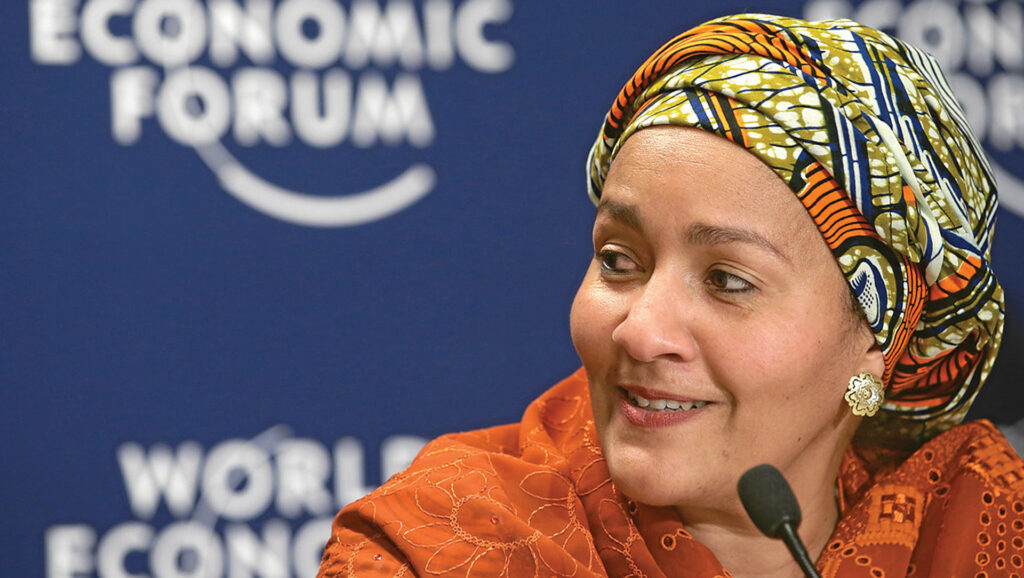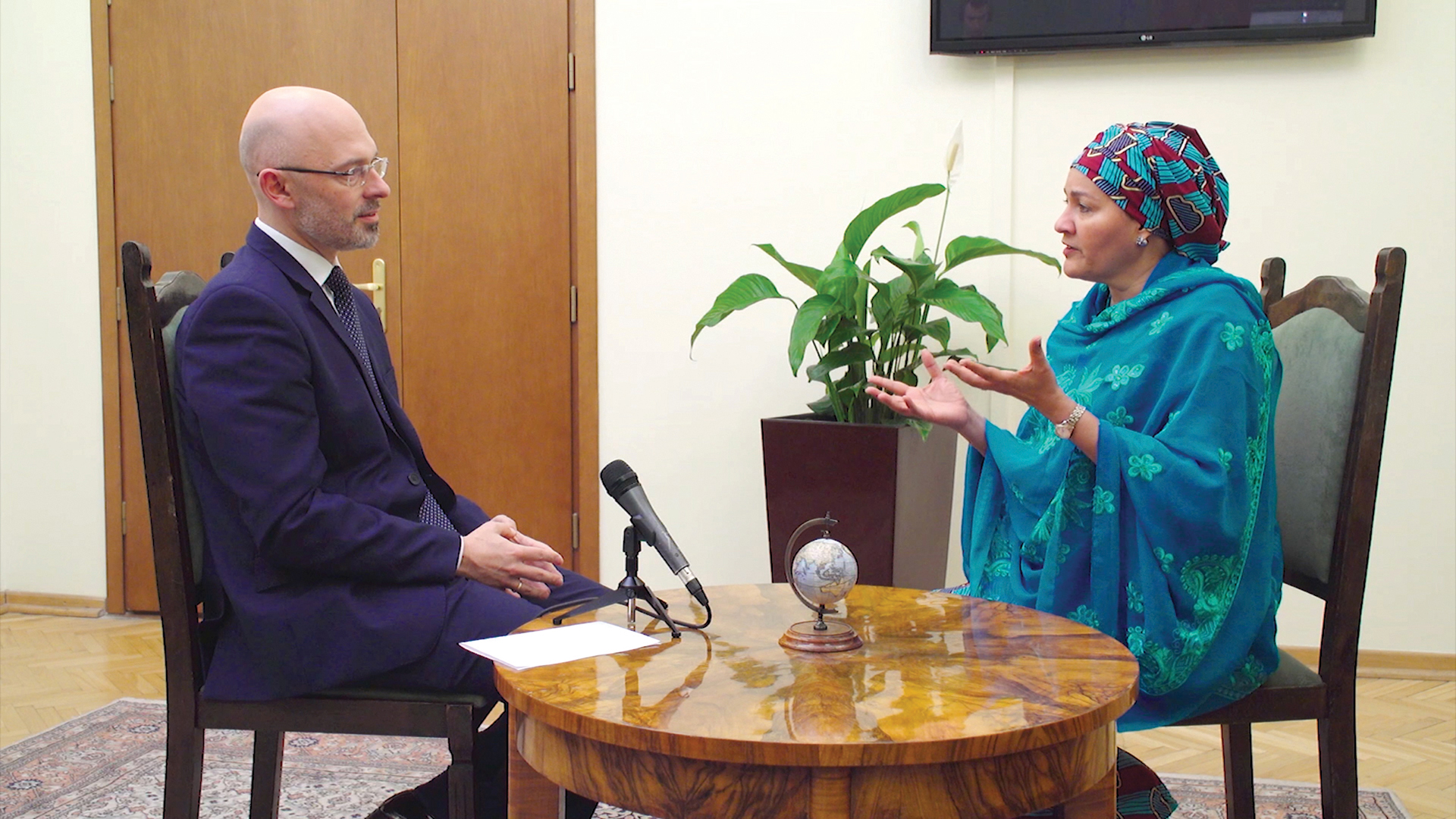Former Executive Secretary of the United Nations Framework Convention on Climate Change
Michał Kurtyka: I’m very happy today to be here together with Patricia Espinosa whom we have known for a couple of months. Thank you very much for kindly agreeing to take part in this discussion. Patricia, not only did you enjoy a very successful professional career in Mexico a foreign minister, you also hosted a very successful COP in Cancun, and are currently serving as the Executive Secretary of the United Nations Framework Convention on Climate Change. You and the secretariat will be heading to Katowice in just a couple of days. I’m using this opportunity, then, to ask a few questions about our world. How can we imagine the future? What kind of model of development should we aim for if we want to achieve the objectives of the Paris Agreement?
Patricia Espinosa: First of all I want to thank you, Minister, for giving me this opportunity to share some thoughts about this very important topic with you. It’s important regarding climate change, but it’s important in general to have a vision towards the future. And also let me say that I’m very excited that we are working together at this very important conference that will be held in Poland in just few days. Regarding the vision of the future: I think that we have a lot of advantages and opportunities. Yes, it is a challenging task, we have a lot to do, but at the same time we have road maps for that, for achieving that vision. Now, I’m referring here basically to 2, maybe 3, major agreements that were taken by the International Community in 2015. One of them regards the sustainable development goals – they were adopted in 2015, and the other is the Paris agreement. So what does the world look like according to these agreements?
It’s a world where we have no poverty, where we have people having access to healthcare, to energy, as well as to education, where cities are well planned in a sustainable way, where people can live in peace and develop all their skills. As you know the general theme of the Sustainable Development Goals is: leave no one behind. Now, what is the good news about this? Well, beyond the fact that we have the road map, it is also that the technological developments and the knowledge that humanity has been accumulating gives us many tools with which to really achieve this vision of the world. There are many examples of countries that have been able to make progress towards societies that are more inclusive, societies where people don’t suffer poverty, that are there for others to follow. So having clarity on the different aspects, areas that need to be addressed is very important, and having also clarity on the solutions that are out there is also very important. So we need to have cities that have sustainability goals. We need to have cities that, for instance, have very efficient waste processing, cities and communities where there is efficient processing of water. We know that the resources will be decreasing, will diminish and we also know that the population will grow. By 2050 there will be almost 10 billion people, that’s really an incredible increase. And we know that the resources that we are using now are already in danger because we are overexploiting the wealth of the earth. That means we need a future where we use less resources and at the same time provide higher levels of well-being to members of society.
One of the issues at the centre of that agenda is addressing climate change. If we do not address climate change this vision will not be fulfilled.
MK: Thank you very much. That’s an extremely ambitious agenda but if we approach it from the right angle we can get there step by step. But there is one issue which is at the very heart of the climate agenda and that is energy. If we have even more people in the world, if we have more people in cities, how can we ensure that the energy which will be provided to all of us will not only be accessible but will also be in keeping with the objectives of the Paris agreement, with climate neutrality, which needs to be achieved by the second half of the 21st century.
PE: Well you are absolutely correct. Energy is a very important issue in order to be able to achieve the goals that were established by the Paris agreement, namely to maintain global warming below 2 degrees and as close as possible to 1.5. Energy has been a sector of the economy that has driven the well-being of societies in general throughout the development of humanity and I think the good news now in the field of energy is that we are seeing an incredible development of renewable sources of energy that have become much more accessible – in some places with even better prices than fossil fuel energy. This is the case for instance in some communities in India which we know to be a country where this is a very central issue. Why? Because there is a large section of the population that still has no access to energy. So now we are looking at the scenario where in some places in India solar energy is cheaper than energy derived from fossil fuels and it gives us a lot of hope. And there are also places where we can think that the use of renewable sources, such as solar and wind energy, will allow us to provide energy security in countries that today are suffering. Take the case of some of the islands in the Pacific. Many of them are dependent on diesel fossil fuels. Imagine how fragile their situation is because they need to import that diesel from very far away. If we manage to support them to become fully dependent on renewable sources of energy, it will be an amazing transformation for them. They will not need to spend money on importing diesel and they will have a better and more reliable source of energy. Now of course, we still have some technological challenges that have to do with storing that energy. It’s not that it’s impossible but we are not there yet.
However, again, the good news is that we are seeing a lot of investment in research regarding the storage of energy. Another really very exciting development is the oil and gas climate initiative that brings together 13 of the most important oil and gas companies and they have already set themselves some ambitious goals in terms of reducing the emissions, particularly methane emissions. So I think we can look at a future in which energy is clean, renewable and is accessible to everyone and that can allow us to reach 2050 with the possibility of achieving climate neutrality.

MK: You mentioned technology and so the research and development innovation agenda. You also mentioned that we need regulation, something that will be discussed in Katowice – how to implement the Paris agreement and what kind of legal framework to provide to the world in terms of objectives. But there is also the question of finance and there is also a question to which, I think, we dedicate less time – that of societal behaviour. Because sometimes a small change in the behaviour can still achieve a lot. Which of the four : innovation, regulation, finance and societal behaviour – do you see as being the biggest, the most important element?
PE: That’s a good question. I think it is a combination of everything what we need because you are very right when you say that we are talking about an important transformation, and in such a big endeavour you cannot think that only doing one thing or concentrating on one area of commitment is enough. We really need all of it. I would say that until now we have witnessed a lot of challenges regarding the access to finance. This is especially the case with smaller countries, countries that frequently are not so attractive to private investment because of their size, because of their capacity, their economic capacity, so that’s a very important challenge especially for the most vulnerable, the least developed, the poorest countries and it’s something we need to address. That is why the financing part of the regime is so important and we need to focus on this. Now, again, with societal change, you are absolutely right. We, human beings, tend to look for ways of getting to a point where we are comfortable and we feel fine. So whenever there is a change in the status quo, we often feel threatened or we are just fearful because we don’t know how it is going to end.
The unknown makes people nervous, makes people anxious. So I think that their education is particularly important. We need to be able to transmit this – the need for the transformation in the classrooms, through the media, we need to be able to bring this conversation, as some say, to the kitchen table, to make the environment and climate change a kitchen table conversation. We need everyone in the world to be conscious of their own behaviour and what they can do in order to make things better.
MK: I think that there is a growing awareness of the fact that the existing model of development has its limits. The side effects are so important that we need to rethink it and this is also what we will be doing in Katowice, based on the Paris Agreement. I especially remember on one occasion discussing a small island nation where the transformation to make the country completely autonomous based on renewables was not that expensive, it was possible, it was within reach, but the country was, as you said, not attractive enough for the investors. So how can we bring together public money, private money in order to secure this transition?
PE: This is why our meeting in Katowice is so important. What we really need is for the guidelines for implementation to be clear. I think it is obvious that in regards to finance there will be, and needs to be, public as well as private sector finance. In my view we need to make sure that the public money goes to those who are not attractive for private sector investments and that we manage to address their needs and maybe even help them become more attractive also for private investment. Partly because energy is such an important area of the economy, partly, because it’s a big business. At the end, we need to make sure that renewables are also a good business and therefore we get a win-win situation, win-win equation. Our regime, the way of valuing the well-being of people, is putting this framework in practice in such a way that allows developing countries, vulnerable countries, the poorest countries in the world, to receive support from other countries. So I think that we need to concentrate the public finance on those countries, we need to help them build the framework that will make them also attractive for private investment.
MK: And you also mentioned cities, and I find myself in agreement with you, where all 4 issues need to be addressed in terms of technology, in terms of regulation, finance and societal behaviour. When we see that cities will be growing it’s not only a question of changing the technologies to cleaner ones but also of encouraging people to use, for example, more public transportation. This is again linked with the financial question that you just mentioned, so we have all this in one package and I hope that we will be able to move forward with this in Katowice. I also think that it can be a trigger for discussion and thank you very much for your kind answer on how you feel about the future, how we can imagine the future, because we also need to help people, our societies, ourselves to somehow imagine where we want to be. That will make it easier to achieve. Thank you very much. I’m very happy to be here and will hopefully see you again in Katowice and wish we will be able to have a successful conference.
PE: Thank you.
The interview comes from the book “The Future of Energy” published in 2019 by the Bureau of the COP24 Presidency of the Ministry of Climate and Environment of the Republic of Poland.













